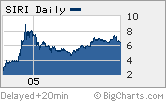 |
| Analysts expect the arrival of Howard Stern to lead to big increases in subscribers for Sirius Satellite Radio. |
|
 |
| Launched into orbit: Shares of Sirius Satellite Radio took off after the company signed Howard Stern in October 2004. |
|
|
|
|
|
|
|
|
|
NEW YORK (CNN/Money) � Fans of a certain radio shock jock can rejoice.
In a little more than three months, Howard Stern will be leaving the traditional radio airwaves -- and the threat of all those FCC indecency fines -- for the world of satellite radio, where he will be free to say whatever he pleases.
It's been nearly a year since Sirius Satellite Radio (Research) announced that it had signed Stern to a five-year multi-million dollar deal that begins Jan. 1, 2006. So what's this mean for investors in Sirius and Viacom (Research), which owns Stern's current radio home, Infinity Broadcasting?
Hard to replace for Infinity
For Viacom, the financial impact is minimal.
Sean Butson, an analyst with Legg Mason, estimates that Stern brings in about $100 million in advertising revenue a year. That's less than a half a percent of Viacom's projected $23.9 billion in sales for this year.
Still, Laura Martin, an analyst with Soleil � Media Metrics, an independent research firm, thinks that Viacom will find it difficult to replace Stern and much of the ad sales he brought in.
To that end, Infinity Broadcasting chairman and CEO Joel Hollander said during a speech at the Advertising Week 2005 conference in New York on Monday that the company is looking to have as many as six hosts fill Stern's time slots in different markets.
"It's a Darwinian experiment. Viacom is hoping that one or two hosts will be as popular as Howard," Martin said. "But Howard is a unique talent and he has loyal advertisers."
Nonetheless, there are a couple of positives about Stern's departure, Martin said.
Since Viacom will be free of Howard's expensive contract, Infinity's profits could get a boost...assuming the decline in ad revenues is not too steep.
Viacom will also likely not have to worry as much about FCC fines.
Huge boost for Sirius
But while the impact of Stern's exit on Viacom is expected to be relatively minor, Sirius could wind up seeing a substantial boost in subscribers and revenues. As of Sept. 15, Sirius had 2.1 million subscribers and the company has said it expects to have 3 million by the end of this year.
Martin thinks that Sirius could finish 2006 with 5.5 million subscribers. And she thinks Stern's presence on Sirius could even lead to subscriber gains at its larger rival XM Satellite Radio (Research).
"Howard Stern is a huge asset for a nascent technology," she said. "He is a celebrity in his own right and he will raise awareness of satellite radio, which is good for the industry."
Legg Mason's Butson thinks Stern's impact on Sirius could be even bigger than expected. He estimates Sirius will end 2006 with 6.8 million subscribers and believes that some analysts' projections are too low because they are factoring in a more gradual rate of Stern fans signing up for Sirius.
"It's reasonable to expect 10 percent of Stern's 10 million listeners to subscribe and many analysts are factoring that in over the 5-year contract," Butson said. "But fanatic Howard Stern fans aren't going to wait two or three years to sign up."
As such, Butson's 2006 revenue estimate of $573 million is slightly higher than the Wall Street consensus of $560 million.
And Thomas Eagan, an analyst with Oppenheimer & Co., adds that Wall Street may be underestimating the amount of ad revenue that Stern can generate. Although a big selling point of satellite radio is the lack of commercials on music stations, Sirius does feature ads on its talk stations and Eagan said that Stern's core audience of young males would continue to be a lucrative draw for many advertisers that have already been sponsors of his show.
Is Stern success already priced in?
But is this already reflected in the stock price? Shares of Sirius shot up nearly 16 percent on the news of Stern's contract last October and the stock has continued to climb since then, gaining nearly 70 percent.
Rob Sanderson, an analyst with American Technology Research, initiated coverage on Sirius earlier this month with a "Hold" rating. In his report, he cited valuation as his chief concern.
The stock trades at more than 15 times estimated 2006 revenue. Sirius, due to high start-up costs, has yet to generate a profit, but the company has said it could post positive free cash flow by the fourth quarter of next year.
Sirius could also face higher expenses in the short-run due to an expected increase in advertising-related costs as Stern's arrival date nears. In addition, the company pays a subsidy to auto makers for the installation of its satellite radios, so a big increase in subscribers could actually hurt cash flow in 2006.
But Eagan, Butson and Martin have a buy on the stock and think that the up-front costs associated with bringing on Stern is a good problem to have. "Stern adds value faster to Sirius than if they not had him," Martin said.
Martha Stewart is also getting "Sirius." Click here for more.
For a look at media and entertainment stocks, click here.
Analysts quoted in this story do not own shares of the companies mentioned and their firms have no investment banking ties to the companies.

|